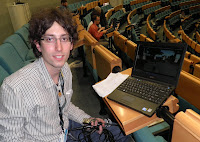 When: Thursday June 3rd, Where; Infolit iSchool (& tour to Tseshkovsky); in Second Life, the virtual world (you need a SL avatar and the SL browser installed to participate)
When: Thursday June 3rd, Where; Infolit iSchool (& tour to Tseshkovsky); in Second Life, the virtual world (you need a SL avatar and the SL browser installed to participate)- 7 am Second Life time, presentation Information Literacy for 21st Century Life
- 8 am SL time reports and discussion on recent conferences; plus at
- 9am SLT (en Espanol) and 12 noon SLT (in English): repeat event: Pi Illios (Universidad Puerto Rico) Literacia en Salud en Second Life (en Espanol, 9am) / Health Literacy in Second Life (in English, noon)
* 7am SL time (see http://tinyurl.com/38755tv for time in other countries): presentation from Sheila Yoshikawa (Sheila Webber in RL, University of Sheffield) on Information Literacy for 21st Century Life (as presented at the Oeiras a Ler conference in Lisbon, Portugal, in May, with some amendment).
Venue: http://slurl.com/secondlife/Infolit%20iSchool/147/170/21
In this presentation Sheila will elaborate a definition of information literacy and give examples of what information, and information literacy, mean in a number of contexts (e.g. in computer gaming, in a workplace, for "tweens") and sum up key messages about IL in the 21st Century.
* 8 am SL time (see http://tinyurl.com/2vlrgup for times in other countries): Report back from recent conferences (Oeiras a Ler, Informa 2010, and any others participants have been to recently!) Venue: http://slurl.com/secondlife/Infolit%20iSchool/43/203/22/
* 9am SL time (see http://tinyurl.com/3aznlgt for times in other countries) Literacia en Salud en Second Life ( en Espanol: Pi Illios, University of Puerto Rico)
Venue: http://slurl.com/secondlife/Infolit%20iSchool/190/215/749/
La Biblioteca Conrado F. Asenjo en el Recinto de Ciencias Médicas de la Universidad de Puerto Rico lleva a cabo un proyecto de Literacia y alfabetización en salud dirigido a hispnos que residen en Second Life .
La literatura profesional señala que el 31,5% de los pacientes de habla inglesa y el 61,7% de habla española presentan una inadecuada o marginal alfabetización funcional en salud.
La plataforma virtual Second Life tiene una población considerable de hispanosparlantes (alrededor de un 11.8 %) que residen en en este mundo virtual por infinidad de razones. Nuestro objetivo es enseñar y orientar al residente hispano en SL a encontrar información de salud confiable, actualizada y adecuada a sus necesidades; see https://sites.google.com/a/upr.edu/tusaludbuscadistingueaprende/?AuthEventSource=SSO
* 12 noon SL time (see http://tinyurl.com/369bq3u for times in other countries) "Health Literacy in Second Life" (talk and tour; in English: Pi Illios, University of Puerto Rico)
Venue: http://slurl.com/secondlife/Infolit%20iSchool/129/242/22/
The Conrado F. Asenjo health library of the University of Puerto Rico has created a prototype for health literacy to help Hispanic residents in Second Life. This is responding to the factthat surveys have shown that people have poor health literacy (31.5% of English speakers and 61.7 Spanish speakers). They have used the platform of Second Life to create a prototype informative build. Pi Illios with introduce their work, and then take people on a tour of the build on Tseshkovsky; see this page/a>
You have read this article events
with the title May 2010. You can bookmark this page URL http://monochromaticstyle.blogspot.com/2010/05/information-health-literacy-events-in.html. Thanks!
























